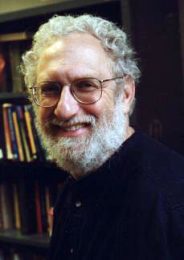Religious environmentalist and philosopher Roger Gottlieb is leading the course “Religion, Ecology and Religious Environmentalism” in the Wake Forest University Divinity School at a time when many diverse religious groups are acknowledging the importance of addressing environmental crises like global warming and pollution.

Roger Gottlieb
Gottlieb, a professor of philosophy at Worcester Polytechnic Institute in Massachusetts, is teaching the course for approximately 16 students in the Wake Forest Divinity School over three weekends during the spring semester 2006. He will also lead two free, public lectures at Wake Forest on Feb. 25 and March 25. The lectures will explore the intersection of religion, spiritual life, the Holocaust and the environmental crisis. Gottlieb said he will ask lecture participants “to consider how we have committed genocide and ecocide, and how, having done so, we can make sense of our belief in God or our spirituality.”
The author or editor of 14 books and more than 50 articles on environmentalism, religious life, political philosophy, Marxism, the Holocaust, feminism and disability, Gottlieb said that during the past 20 or 30 years he has observed religions of the world make an unprecedented shift to take serious responsibility for and attempt to address the environmental crisis.
“The environmental crisis is a religious concern because most religions have some account of the human relationship to nature,” Gottlieb said. “In so far as religions are concerned with suffering, the suffering of non-human beings, environmental degradation is creating an enormous amount of suffering for those beings.
“The environmental crisis is also extremely destructive for human beings,” he said. “It causes illness, dislocation, destroys cultures. We are hurting human beings. If it’s a religious concern because I shoot somebody, surely it’s a religious concern if I put chemicals in the air that give a person cancer.”
Gottlieb edited the first large-scale text that deals with the religious dimensions of the environmental crises, “This Sacred Earth: Religion, Nature, Environment.” He is editor of six academic book series, book review editor of Social Theory and Practice and has a review column in the national magazine Tikkun. He is on the editorial board of Capitalism, Nature, Socialism: A Journal of Socialist Ecology and Worldviews: Religion, Nature, Culture. His forthcoming book, “A Greener Faith: Religious Environmentalism and Our Planet’s Future,” is scheduled for release in April.
He said many religious groups have recently voiced concern about environmental degradation, including the “What Would Jesus Drive?” campaign launched by the Evangelical Environmental Network a few years ago, and the recent announcement of a new push called the Evangelical Climate Initiative, which released the statement, “Climate Change: An Evangelical Call to Action,” in February.
According to the Associated Press, the statement was signed by many leading conservative Christians including the Rev. Rick Warren, author of “The Purpose Driven Life,” the president of evangelical Wheaton College, the national commander for The Salvation Army and heads of seminaries and mega-churches nationwide.
Gottlieb said he wants students in his course at Wake Forest, many of whom will enter a career in the ministry, to realize that, “A concern with the human relationship to nature and concern with the moral dimension of our environmental practices is as essential a part of religion as anything else — as conversations about God, conversations about family, conversations about community.”
“This is an absolutely essential part,” Gottlieb said. “If religious people are concerned about war and peace, if they are concerned about pornography, if they are concerned about drugs, they absolutely must be concerned about this as well.”
Gottlieb’s course has met once this semester and will meet again Feb. 24 and 25 and March 24 and 25. Friday sessions run from 3 to 6 p.m., and Saturday sessions run from 9 a.m. to noon and 1 to 4 p.m.
Gottlieb’s first public lecture at Wake Forest, “Working Ourselves to Death: What the Holocaust Can Teach Us About the Environmental Crisis,” is scheduled for 10 a.m. Feb. 25 in the university’s Wingate Hall.
The second public lecture, “Spiritual Life, Environmental Despair, and the Problem of Evil,” is scheduled for 10 a.m. March 25 in Wingate Hall.
Gottlieb’s lectures are sponsored by the Wake Forest Divinity School and the university’s philosophy department.
Categories: School of Divinity
Headlines
Wake Forest in the News
Wake Forest regularly appears in media outlets around the world.




